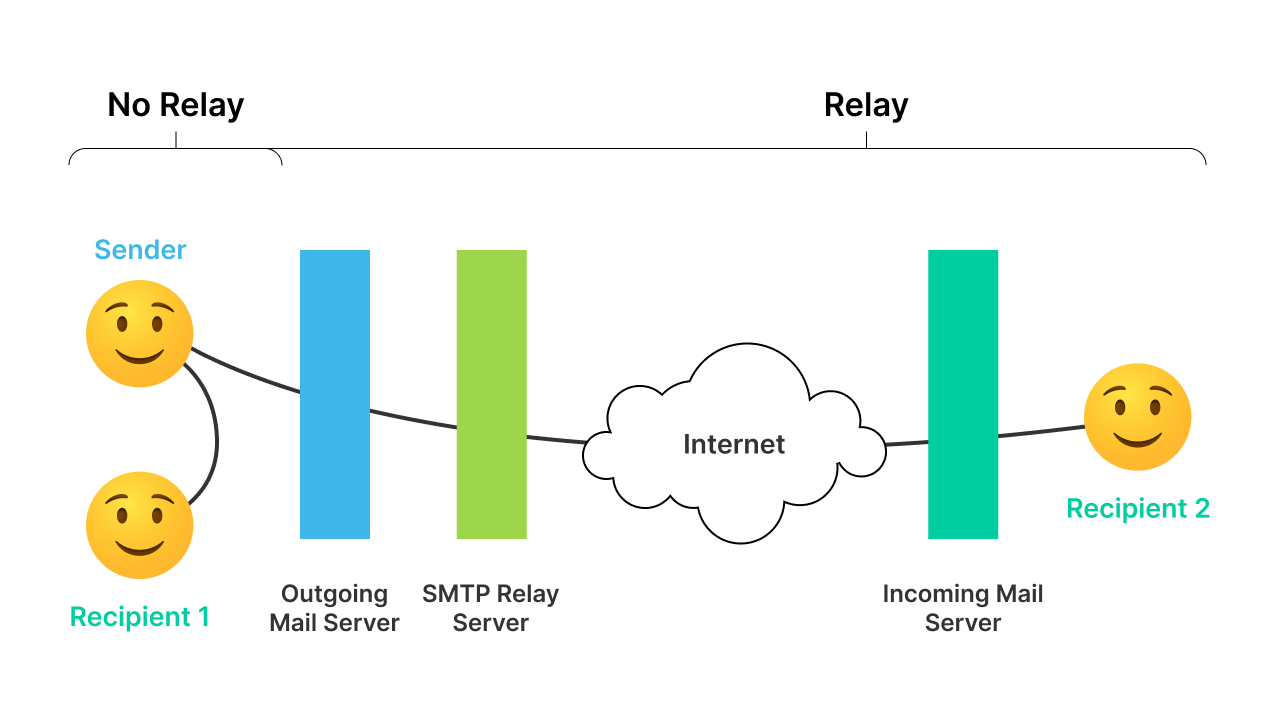An SMTP Smart Host is an intermediary server between the sender's server and the email recipient's server. Personal or corporate mail servers use it to send messages. But does email transfer really require a smart host as an intermediary?
Typically, an email will make its way from the sender's server directly to the recipient's server. But if the sender experiences deliverability issues interfering with daily operations or just wants an easier way to handle outgoing mail, they can use an SMTP smart host server to enhance email delivery. Consider a smart host server as a safer alternative to a potentially faulty email delivery stream. Businesses can redirect the mail through a smart host server when they encounter blockages due to internal or external factors.
Besides, the initial sending server does not even need to be fully set up if it is only used to connect to a smart host service. For example, companies may prefer to use a smart host as a central mail server (in-house or provided by a third party), with a number of “dumb hosts” for departments, to cut maintenance costs.
History of Smart Hosts
In 1982, as the number of users and connected computers grew, the Internet developers implemented the Simple Mail Transfer Protocol (SMTP). SMTP defined the set of rules for sending and receiving electronic mail messages. Four decades later, SMTP still remains the foundation of how email is handled.
Maintaining a central address book of email recipients was then one of the earliest challenges facing email. The domain naming system (DNS) and MX records for email routing haven't yet emerged. Since every connected computer had no means to easily find every other connected computer, open mail relays were created.
An open mail relay was a centralized server dedicated to receiving and forwarding email messages. Any internet user could point their email client to one of these servers, and their emails would be routed to their intended recipient — often via other open email servers.
These open mail relays were better at determining the best mail routing path than a basic system, so they were called smart hosts (or smarthosts). Smart hosts figured out the best path for an email message to take so that individual machines didn't have to maintain directories and network maps.
Smart hosts were initially established as a public service. But as soon as spam, or unsolicited commercial email, began to overwhelm the net, open mail relays quickly became a part of the problem.
Internet servers soon began to block open mail relays, forcing smart host operators to quickly adjust to the new, spam-infested reality. The US Controlling the Assault of Non-Solicited Pornography and Marketing (CAN-SPAM) Act was passed in 2003, which sped up efforts to better manage email delivery.
Consequently, the term "smart host" came to refer to a non-open (authenticated) mail relay server. Nowadays smart hosts have several safeguards to stop spammers and scammers from abusing them.
What exactly does a smart host do?
A modern smart host is an essential component of any operation that involves transmitting large volumes of email messages. It offers the following features:
- Mandatory authentication (unlike an open mail relay);
- Significantly higher hourly or daily limits on the number of email messages sent (as compared to typical ISPs);
- Maintaining a positive email sender reputation (avoiding blocklists and the need for IP warming);
- Email filtering and scanning attachments for viruses, malicious scripts, email phishing, and other threats.
How Can a Smart Host Server Help You?
Besides ensuring a higher deliverability rate, advantages associated with using an SMTP smart host service include:
-
Ease of Setup and Integration
Acting as an intermediary, the smart host manages all connections to receiving mail servers for you. Your server or application only needs to connect to the smart host using the SMTP protocol. For this, you only need to carry out a simple one-time configuration process, specifying your login, password and port number.
-
Email Authentication
A smart host server has built-in authentication for senders so that only authorized senders can relay through it. This improves the server's security and your email deliverability, resulting in a higher inbox delivery rate. If a sender has multiple mail streams, they can combine them through a smart host server for unified authentication and safelists.
-
Reporting
Some smart host service platforms provide extensive analytics, reporting, and statistics on your email delivery, allowing you to monitor the effectiveness and performance of your mailing with configurable dashboards, charts and graphs.
Why You Might Need an SMTP Smart Host Service Provider
Now that you've understood the concept of a smart host, let's discuss why email administrators might need an SMTP smart host service. While these are just a few examples that may require a smart host email service, there are many benefits to using one, regardless of your situation.
-
Sending High Volumes of Email With Good Deliverability
Regardless of how good your intentions as an email sender are, it can be difficult to send email without ever experiencing spam blocking if you don't have a very good sender reputation, both for your sender domain and server IP. Smart hosts help you send bulk emails by routing campaigns through a server with an excellent IP reputation to ensure delivery.
-
On-Premise Spam Filter Leak
Companies that use an on-premise spam filter may encounter a leak that allows outgoing spam to pass through. If the suspicious user remains unnoticed, the spam volume will quickly outnumber the good mail, resulting in a significant decrease in deliverability. In such cases, by using the SMTP smart host server you can bypass the damaged system and deliver the emails.
Wrapping Up
Email management must constantly evolve to protect users from spam, fraud, and identity theft. Whether you need to send transactional, promotional, or personal emails, problems like a bad IP address reputation or an email system malfunction can impede your communications. With a smart host relay service, a good email service provider can quickly solve any deliverability problem.
UniOne offers smart host email service via its SMTP API. Check the documentation page for more details.


 05 may 2023, 12:24
05 may 2023, 12:24
 467
467


